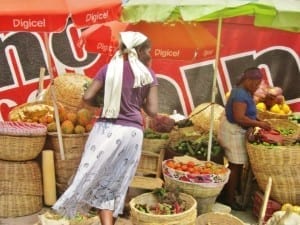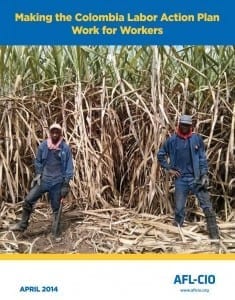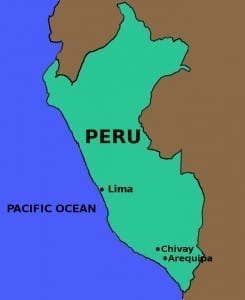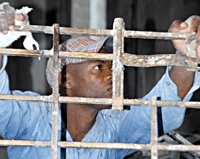Apr 17, 2014

Despite rising exports, Haitian garment workers are paid so little they can barely afford food. Credit: Lauren Stewart
Despite a 45 percent increase in apparel exports since the 2010 earthquake in Haiti, the women and men who sew T-shirts and jeans primarily destined for the U.S. market barely earn enough to pay for their lunch and transportation to work, a new Solidarity Center survey finds.
The average cost of living for an export apparel worker in Port-au-Prince is 26,150 Haitian gourdes (about $607) per month. Yet workers are paid only between 200 gourdes (about $4.64) and 300 gourdes for an eight-hour day (about $6.96). After insurance and social security deductions, most export apparel workers must spend more than half of their salaries on transportation to and from the factory and a modest lunch, leaving little to sustain a family or keep a roof over their heads.
“Workers interviewed in this study had to forgo basic necessities given the disparity between their earned wages and the cost of living,” according to the report. “When asked what they would purchase if they had sufficient income, workers responded with: more food to feed their families, land to build a home, (and) a car or moped to drive their children to school.”
The Solidarity Center survey finds that a real living wage must be approximately 1,000 gourdes (about $23) per day to enable workers to meet basic needs. Haitian unions are demanding a minimum wage increase to at least 500 gourdes (about $11.60) per day and assert that anything lower equates to starvation wages. Despite the export industry’s growth, Haitian law mandates a reduced minimum wage for the sector, which is the lowest in the Western Hemisphere.
Housing (rental) costs spiked immediately after the earthquake, but prices have since fallen by nearly 28 percent. Yet workers still live in substandard housing and pay up to four times more than what they did prior to the disaster. Some families are unable to afford their children’s transportation to school, so many students must walk, sometimes long distances and along busy roads.
“The High Cost of Low Wages in Haiti” analyzed such expense categories as housing, energy, nutrition, clothing, health care, education and transportation to classify the costs of an export apparel worker. The report also includes charts breaking down each category of expense. It follows a similar informal study the Solidarity Center conducted after the earthquake and used the same locally appropriate basket of goods to calculate the cost of living for a three-member household, comprised of one adult wage earner and two minor dependents (ages 8–14).
The report concludes: “Workers need access to decent jobs that pay a living wage and allow them to lead a dignified life. So long as jobs perpetuate worker exploitation and serve only as a means to fend off starvation, poverty will continue to grip the country and hinder the reconstruction process.”
Read the full report.
Apr 8, 2014
 The governments of Colombia and the United States signed the Labor Action Plan (LAP) three years ago this week. The plan was intended to provide a road map for Colombia to protect internationally recognized labor rights, prevent violence against labor leaders and prosecute the perpetrators of such violence.
The governments of Colombia and the United States signed the Labor Action Plan (LAP) three years ago this week. The plan was intended to provide a road map for Colombia to protect internationally recognized labor rights, prevent violence against labor leaders and prosecute the perpetrators of such violence.
As a new AFL-CIO report shows, systemic violence against Colombian workers continues and workers still face persistent employer abuses. Palm workers like Miguel Conde of the union SINTRAINAGRO at the Bucarelia plantation initially were hopeful, but the LAP profoundly failed to deliver on its promises. In the blog, “Make the Colombia Labor Rights Action Plan Work for Workers,” the AFL-CIO Now writes:
“Like many Colombian workers, palm workers at Bucarelia were increasingly hired on as temporary subcontracts. Subcontracting prevents workers from forming unions, gets employers out of paying social security and other benefits due to direct hires and makes it easier to fire anyone who complains or supports unions., the LAP was supposed to end abusive subcontracting of those doing a company’s core work. When workers at Bucarelia learned about the promised reforms, and that the palm sector had been specifically identified in the LAP, they launched an organizing campaign, thinking they had a way forward.
Apr 4, 2014
 Thousands of Peruvians marched in Lima, the capital, yesterday in a strong show of support for an end to organized crime and related violence in Peru’s booming construction sector.
Thousands of Peruvians marched in Lima, the capital, yesterday in a strong show of support for an end to organized crime and related violence in Peru’s booming construction sector.
Unions and civil society leaders called for a systemic solution to the phenomenon of false “unions” that extort construction firms and turn building sites into battlefields across Peru. Violence related to worksite conflicts has resulted in the death of six construction worker union activists over the last three years and significant economic losses that affect construction projects, workers and their families.
Leaders of the march include the General Confederation of Workers of Peru (CGTP), the Construction Workers Federation, the Peruvian Human Rights Commission, the mayor of Lima, regional lawmakers and the Peruvian Chamber of Construction.
Mar 27, 2014

Construction unions and migrant workers met this week in Costa Rica. Photo coursesy of BWI.
This week, eight construction union federation from six South and Central American countries came together in Costa Rica to focus on migrant workers and the issues they face in order to help migrants working in construction to organize and to improve union capacity to expand worker rights for migrant and native workers alike.
The seminar, jointly assembled by the Solidarity Center and Building and Woodworkers International (BWI), allowed union representatives the opportunity to present best practices for organizing migrant workers and to speak directly with Nicaraguan day laborers who also are active members of the Costa Rican BWI affiliate, SUNTRACS. Union leaders heard firsthand accounts of the daily challenges that Nicaraguan migrants face on the job and in Costa Rican society in general, where discrimination—including denial of treatment by the national health service for work-related injuries and receiving salaries that are below the national minimum wage—is a fact of life.
According to the International Labor Organization (ILO), more than 5 million people currently live and work in Latin American countries other than those in which they were born. Once a phenomenon almost exclusively restricted to developed countries in the Northern Hemisphere, positive trends in economic growth and job creation have converted numerous Latin American countries—such as Brazil, Chile, Argentina and Costa Rica—into attractive destinations for migrant workers over the last decade. Nonetheless, the promise of decent employment in these countries in sectors including construction, domestic work and agroindustry has remained elusive, particularly for workers without solid knowledge of their own labor rights enshrined by national law and international norms.
On a regional level, BWI and its affiliates have helped migrant workers obtain legal migratory status and advocated for more transparent national immigration policies. Most importantly, they have organized protest actions against insecure work environments, long working hours and wage irregularities for migrant workers.
BWI has seen positive results from its outreach efforts to migrant workers. “Objective economic conditions in Latin America have given new life to construction unions in the Southern Cone. The current construction boom in Brazil, for example, parallels what we saw in countries like the United States and Spain before the 2008 economic crisis,” said Nilton Freitas, BWI regional representative for Latin America and the Caribbean. “Using this new leverage and employing better forms of cooperation among our affiliates, we now are in a more advantageous position to prevent migrant workers from being treated as second-class citizens in the construction sector in those countries.”
The Solidarity Center and Building and Woodworkers International (BWI) have been working together over the last three years to promote innovative policies to improve union outreach and organization of migrant workers in the civil construction sector in Latin America. BWI’s pioneering role in the defense of immigrants who have sacrificed all to construct soccer stadiums in Brazil, skyscrapers in Singapore and offshore oil rigs in the Arabian Gulf was recently recognized by the AFL-CIO as the 2014 recipient of its prestigious George Meany-Lane Kirkland Human Rights Award.
Mar 25, 2014

Haitian migrant worker in the Dominican Republic. Credit: Solidarity Center.
This week the Inter-American Commission on Human Rights is meeting in Washington, D.C. One of the cases the commission will hear regards the Dominican Republic’s September 2014 Constitutional Court ruling that retroactively strips individuals who are unable to prove their parents’ regular migration status of their citizenship.
A new AFL-CIO and Solidarity Center report describes what this could mean for the people who will be disproportionately affected—individuals of Haitian descent living and working in the Dominican Republic, including those born in the country.
Those targeted by the court’s ruling will be excluded from any activity that requires official identification, including working in the formal sector, attending school, opening a bank account, paying into retirement or social security funds, accessing health services, getting married, traveling or voting. For many women, men and children born in the Dominican Republic, the ruling means being barred from participating in the only society they have ever known.
In the report, Dominicans of Haitian descent describe their struggle to maintain their status, pursue higher education, seek opportunities for meaningful work and career advancement, obtain justice against abusive employers and ensure their children are recognized as citizens and have access to critical services.
This deliberate creation of a stateless underclass is an egregious abuse of fundamental human rights and a clear violation of international law.
The AFL-CIO and Solidarity Center are committed to working with their union partners in the Dominican Republic, Haiti and overseas to ensure that all workers and their families in the Dominican Republic have full protection of their human and labor rights. The organizations call on the Dominican Republic to comply with its international obligations and ensure that Dominicans of foreign descent can fully and freely participate in society.





